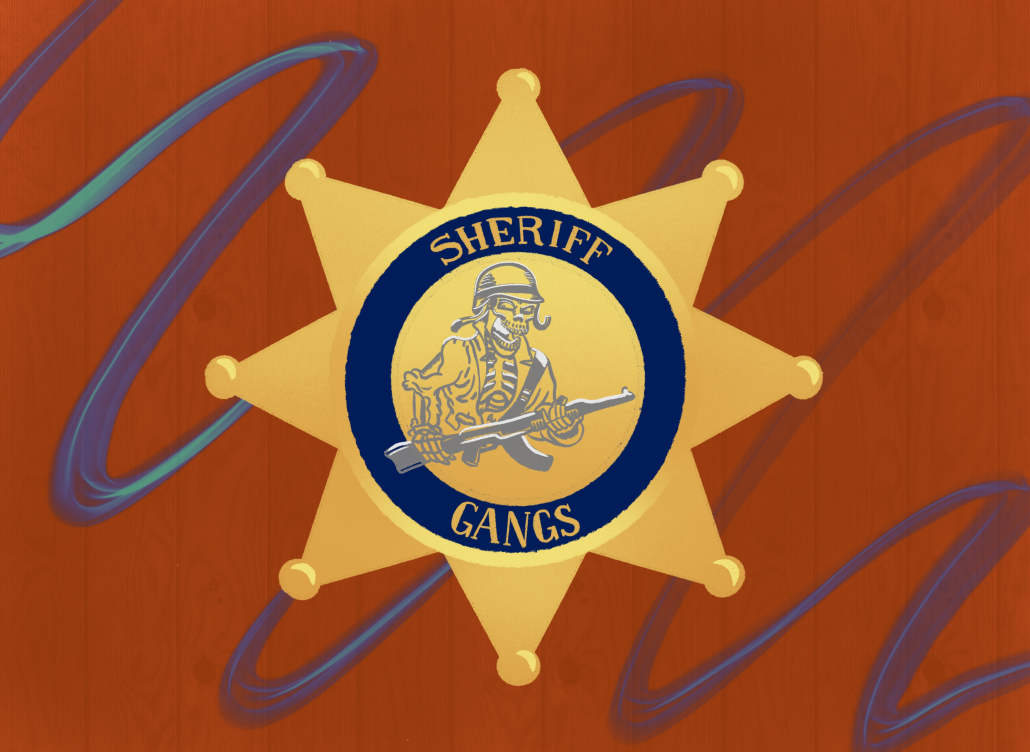Law & Disorder: The banning of sheriff gangs is long overdue
In an extensive study published January 2021, the Center for Juvenile Law & Policy at Loyola Marymount Law School presented 50 years of evidence of at least 18 deputy gangs within the Los Angeles County Sheriff’s Department. With names such as the “Compton Executioners” and “Wayside Whities” and matching tattoos to go with them, these stories sound like urban myths meant to scare the community.
However, they’re very much real and yet L.A. County Sheriff Alex Villanueva continues to deny and downplay these secret subgroups’ existence within his department.
In a video addressing deputy cliques, he said, “I have seen no evidence of three or more deputies engaging in criminal activity with a unifying symbol, whose primary purpose is to commit crime.”
In a press conference at the L.A. Hall of Justice Sept. 22, Villanueva stated that these subgroups have dissolved. “They’re retiring, they no longer exist” and the report “[was] not interested in the truth,” Villanueva said in response to external investigations such as the LMU study and the RAND Corporation’s report, which outlined the existence of these deputy gangs.
“If a subgroup of any set of employees engages in misconduct, that is when I, as an employer, can intervene. [The RAND researchers claim] that we can just ban groups outright. Well, that is not constitutionally permissible,” Villanueva said.
Despite Villanueva’s denial, misconduct has occurred. Deputy gangs have been involved in at least 133 shootings in the past five years and have killed over 40 people — that we know of. What intervention has occurred? Where are the internal investigations? The disciplinary actions? A slap on the wrist and empty threats and reforms are not going to cut it.
In regards to the “constitutionally permissible” part of his quote, Villanueva has the broad legal authority to shut down these groups as they exist within the LASD.
In a memo obtained by the Los Angeles Times, county lawyers from the Office of County Counsel wrote, “Because a ban on subgroups is connected to employees’ conduct in their capacity as LASD personnel, not as private citizens, it likely does not implicate the First Amendment. Subgroups do not exist separate and apart from LASD employment. They are defined based on LASD stations, bureaus, or units, and their activities are intertwined with law enforcement functions.”
It’s not possible to stay in denial any longer. Multiple external investigations have revealed the existence of secret subgroups within the LASD that partake in “pervasive initiation rituals” and violent behavior. Furthermore, the L.A. County Civilian Oversight Commission fully recognizes these deputy gangs’ existences and “acknowledges it is a significant problem that requires a proactive and multifaceted response.”
They even issued a subpoena to Villanueva to further discuss the actions he must take against deputy gangs, but the sheriff refused to attend. He called them “a kangaroo court” whose “entire role is to discredit the sheriff’s department.”
The only prominent action Villanueva, or any LASD leader, has taken is paying millions of dollars in settlements to hide the scandals of their subgroups. According to data from the L.A. County Counsel’s Office, L.A. County has paid a total of around $55 million in case settlements involving allegations of sheriff deputy gangs, with $21 million paid within the past 10 years, which is taxpayer money too.
Villanueva has frequently described these subgroups as cliques and social groups. “The overwhelming majority of deputies who socialize with each other are no different than other social groups in military organizations, sports teams, college fraternities or even those that unite for a common cause,” Villanueva said.
This analogy is ludicrous, but even if they were just fraternities that just engage in hazing, our best-case scenario, as the L.A. Times’ Editorial Board described, is a “secret and unofficial but armed and publicly paid law enforcement organization asserting its own sort of supervision, assignment and promotion, unaccountable to the official chain of command.”
These aren’t unsubstantiated accusations or mere fraternities going haywire. These are real-life occurrences of secret, unofficial groups within L.A. County who use and encourage excessive force targeting communities of color while lacking any accountability whatsoever.
To say our law enforcement system is flawed would be a grave understatement. It is broken and has been since its creation. The South developed the very first police forces to preserve slavery, and our modern-day law enforcement still maintains the 1700s slave patrol mentality. This is evident with deputy gangs.
In an article with the L.A. Daily News, Sean Kennedy, the executive director at the Center of Juvenile Law & Policy, emphasized the need for internal investigations.
“They need to just release the info, and let various people and groups investigate,” Kennedy said. “If it’s just as some say, a harmless social group, then nothing will come of it. But the more startling allegations … that should concern us all.”
Outside of calling more public attention to this issue, the Times Editorial Board suggests voters demand the next sheriff candidates clearly set their positions on deputy subgroups so constituents can hold them accountable to their statements. With the primary sheriff elections only eight months away, we need a candidate that will uphold their word, enforce their reforms and shut down these subgroups — and it’s not Villanueva.
Creating a positive attitude toward law enforcement is one of this country’s greatest problems, but abolishing deputy gangs is a critical place to start.
Helen Nguyen is a junior writing about law and social issues. Her column, “Law & Disorder,” runs every other Monday.


